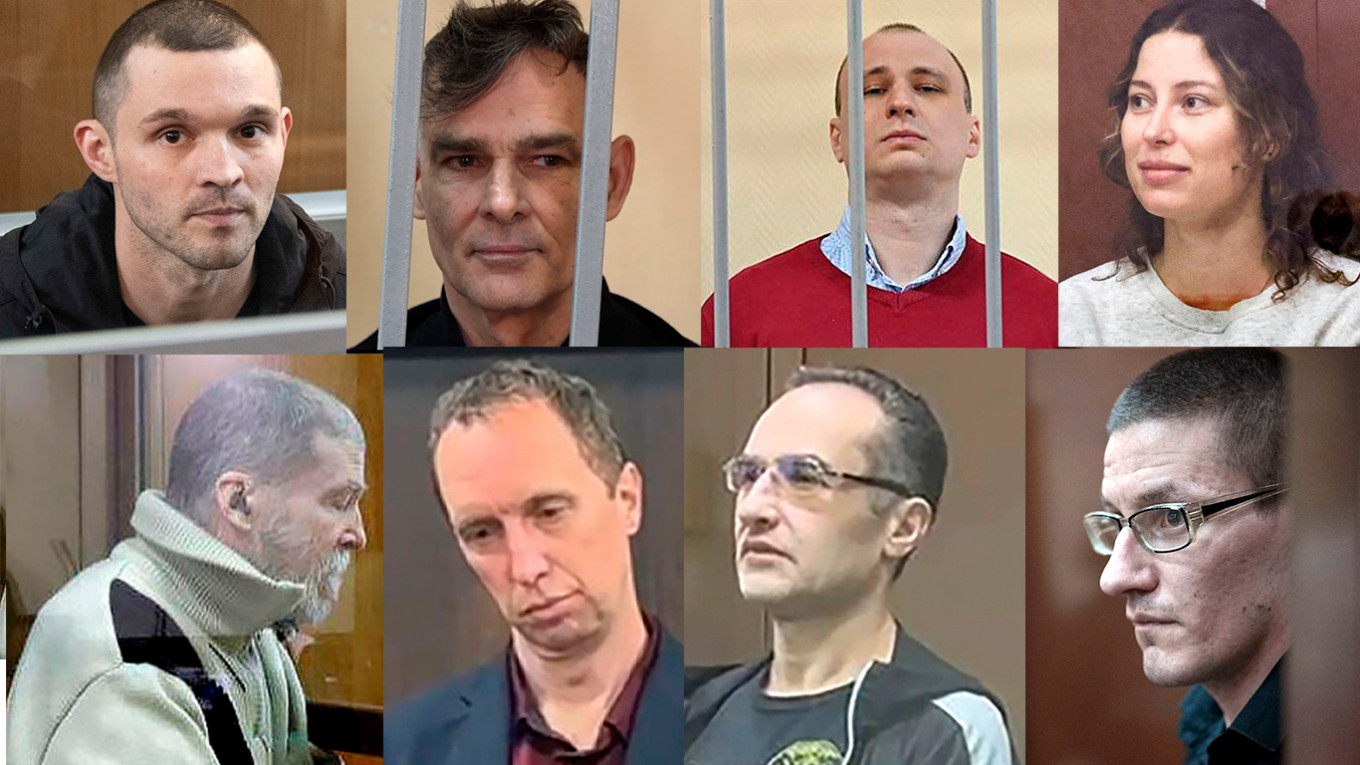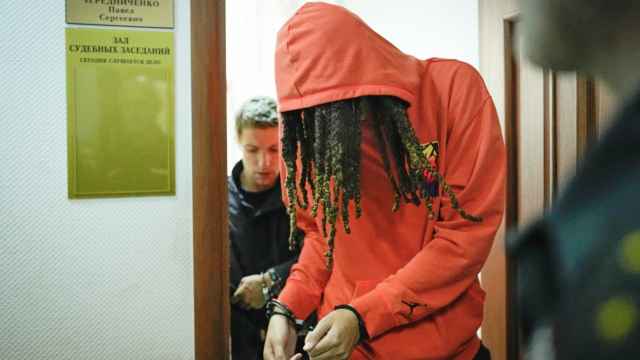Russia freed former U.S. teacher and diplomat Marc Fogel as part of a deal brokered by President Donald Trump's administration on Tuesday.
Following Fogel's return to the U.S., Trump said another detainee is set to go free from Russia on Wednesday.
The Trump-orchestrated deal comes months after three Americans, including former U.S. Marine Paul Whelan and journalists Evan Gershkovich and Alsu Kurmasheva, were freed in a historic prisoner swap between Russia and the West.
Here is a look at the highest-profile American citizens currently in Russian prison who could potentially be freed:
Gordon Black
U.S. staff sergeant Black, 34, was arrested in May last year in the Far East port city of Vladivostok, where he was visiting a Russian woman he met and dated while stationed in South Korea.
Black’s girlfriend, identified by Russian media as Alexandra Vashuk, accused him of stealing around 10,000 rubles ($113) from her and said he had physically attacked her.
A Russian court found Black guilty of theft and of threatening to kill Vashuk and sentenced the American to three years and nine months in prison.
In October, Russian state broadcaster Rossiya aired a TV segment featuring Black in which the soldier said he “wants to go home” to the U.S. “but the decision is up to my government.” It was not clear whether the man was speaking under duress.
David Barnes
A Russian court sentenced 67-year-old Barnes to 21 years in prison last February, finding him guilty of sexually abusing his sons when they lived in the United States.
Allegations against Barnes were previously found uncredible by law enforcement officials in Texas.
Barnes was arrested in January 2022 just a few weeks after arriving in Moscow to seek custody over his children in a local court system.
“He went because he wanted to establish legal visitation with his children,” Barnes’ older sister Carol told ABC News. “That's the only reason he went.”
Barnes’ imprisonment followed a years-long divorce process and child custody dispute with his Russian ex-wife Svetlana Koptyaeva, who illegally took their two sons to Russia despite the ongoing court dispute, according to information obtained by ABC.
Robert Gilman
Gilman, 30, was sentenced to four years and six months in prison in October 2022 for allegedly kicking a policeman in the city of Voronezh in western Russia.
Though this sentence was later reduced to three and a half years following an appeal, Gilman appeared in court again in June last year to face new charges of allegedly punching prison guards and an investigator.
Gilman pleaded guilty to the latest assault charges and was subsequently sentenced to seven years and one month in a penal colony and a fine of 300,000 rubles ($3,191).
Stephen Hubbard
Hubbard, who turned 73 on Thursday, is the oldest U.S. citizen held in a Russian prison and one of the two Americans — together with the recently released Fogel — currently designated as “wrongfully detained” in Russia by the U.S. State Department.
Hubbard, a retired English teacher, was captured by Russia in the eastern Ukrainian town of Izium at the outset of Russia’s full-scale invasion in 2022 and was moved through at least five different detention centers before appearing in a closed trial in Moscow last fall, according to the New York Times.
The Moscow City Court sentenced Hubbard to six years and 10 months in prison for allegedly fighting for Ukraine in September.
Freed Ukrainian POW Ihor Shyshko, who was held in Russian detention alongside Hubbard for two years, recounted Hubbard being tortured by Russian law enforcement in several interviews with the media.
Ksenia Karelina
Karelina, an aesthetician and manager at a spa salon in Beverly Hills, was detained in January last year while visiting her family in Yekaterinburg in Russia’s Ural Mountains.
Karelina, who has been living in the U.S. for over a decade, was initially sentenced to 14 days in jail on charges of “hooliganism,” but was ordered to two months of pre-trial detention on suspicion of committing treason before she could make it out of the detention facility.
In August, a Russian court sentenced the 32-year-old to 12 years in prison for donating $51.80 to the New York-based charity Razom for Ukraine.
Russia's FSB security service claimed Karelina’s donation was "used to purchase tactical medical supplies, equipment, weapons and ammunition for the Ukrainian armed forces."
Michael Travis Leake
Rock musician and former U.S. paratrooper, Leake was sentenced to 13 years in prison in July on charges of "organizing a drug dealing business involving young people."
Leake was jailed alongside Veronika Grabanchuk, another defendant convicted of drug charges. Her relation to Leake was not immediately clear.
Robert Romanov Woodland
Woodland, a dual U.S.-Russian citizen, was born in Russia and adopted by an American family in the early 1990s. He decided to return to Russia in 2020 to reconnect with his birth mother.
The 31-year-old, who worked as an English teacher in Moscow, was arrested last January for trying to hide 47 grams of mephedrone. He was subsequently sentenced to 12.5 years in prison.
Woodland’s lawyer asked the court to reduce the sentence, saying the man pleaded partially guilty, but a Moscow court upheld the ruling in November.
Daniel Joseph Schneider
A court in Russia’s Europen exclave of Kaliningrad sentenced Schneider to six years in prison in September for trying to escape from the country with his four-year-old son, a Russian citizen, without the permission of the mother.
Russian authorities claim Schneider was detained by the country’s border security officials in the Kaliningrad region when trying to illegally cross the border with neighboring Poland “through a forest and a swamp.”
Gene Spector
A naturalized U.S. citizen, Spector was born and raised in the Soviet Union. He returned to Russia with his family later in life and served as CEO of Medpolimerprom, a group of companies that makes plastic medical devices.
Spector, 53, was initially sentenced to four years in prison in 2021 for “mediating” a bribe to the aide of former Russian Deputy Prime Minister Arkady Dvorkovich in the form of vacations to Thailand and the Dominican Republic.
The sentence was later reduced by six months following a retrial, but Russian authorities brought new espionage charges against Spector and sentenced him to 15 years in prison in December.
Russian security services claim that Spector aided the Pentagon in creating “a high-speed genetic screening system for the Russian population.”
Joseph Tater
Tater was detained in Moscow in August and accused of assaulting a police officer after abusing staff at a hotel.
At an appeal hearing against the pre-trial detention in September, Tater criticized the U.S. government and media and claimed that he had been targeted by the CIA, Russian state news agencies reported.
During the same hearing, his lawyer told the judge he had come to Russia to "obtain political asylum in connection with persecution by the relevant authorities in the United States."
Tater faces up to five years in prison.
A Message from The Moscow Times:
Dear readers,
We are facing unprecedented challenges. Russia's Prosecutor General's Office has designated The Moscow Times as an "undesirable" organization, criminalizing our work and putting our staff at risk of prosecution. This follows our earlier unjust labeling as a "foreign agent."
These actions are direct attempts to silence independent journalism in Russia. The authorities claim our work "discredits the decisions of the Russian leadership." We see things differently: we strive to provide accurate, unbiased reporting on Russia.
We, the journalists of The Moscow Times, refuse to be silenced. But to continue our work, we need your help.
Your support, no matter how small, makes a world of difference. If you can, please support us monthly starting from just $2. It's quick to set up, and every contribution makes a significant impact.
By supporting The Moscow Times, you're defending open, independent journalism in the face of repression. Thank you for standing with us.
Remind me later.







